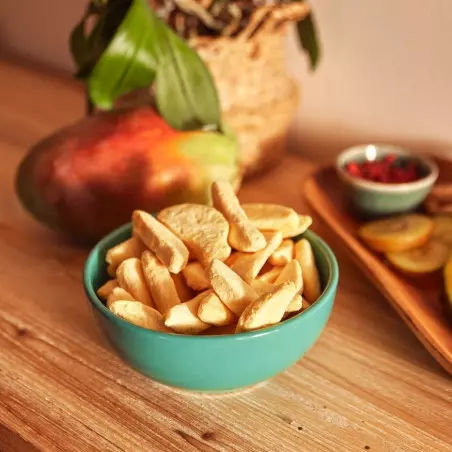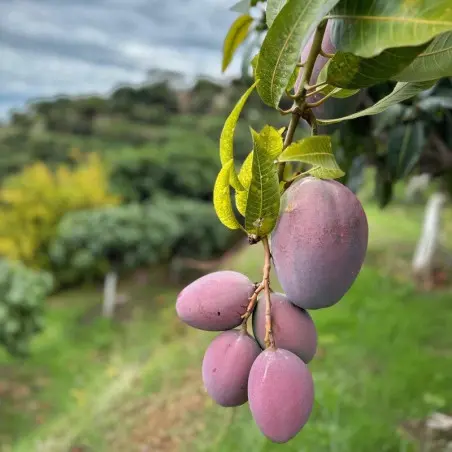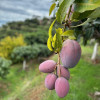Among the many exotic fruits as we have seen in our previous articles, today we are going to tackle the mango .. Dive with us into the juicy and sweet world of this fruit with multiple benefits and exquisite flavor. In addition to being tender and juicy, the mango is full of nutritional qualities and beneficial compounds that can have a positive impact on your health. Let's not delay any further; discover how mango can help improve your quality of life, as this fruit contains secrets just waiting to be revealed.
What is the origin and history of the mango ?
The mango originates from the tropical regions of the Indian subcontinent, specifically in the areas located to the east of India and Myanmar (formerly Burma). It grows on the mango tree, which is a tropical tree with evergreen foliage, and it is considered a symbol of prosperity and fertility in certain regions such as India and Thailand.
This succulent fruit holds a special place in Indian mythology and culture, as it is found in abundance in this region. It is said that she is nicknamed the "king of fruits" ,due to its delicacy and abundance during the summer season. It is also said that it is linked to Buddhism in these regions, as making offerings of fruits like mangoes in Buddhist temples is considered a spiritual act.
Today, this exotic fruit can be found in all tropical countries around the world; it has spread beyond its native lands thanks to trade and travel. Moreover, other varieties of mango have emerged, each with its own shape, color, and special taste. Since then, this fruit has been highly appreciated around the world, continuing to delight taste buds with its sweet flavor featuring notes of honey, nectar, and tropical fruits.
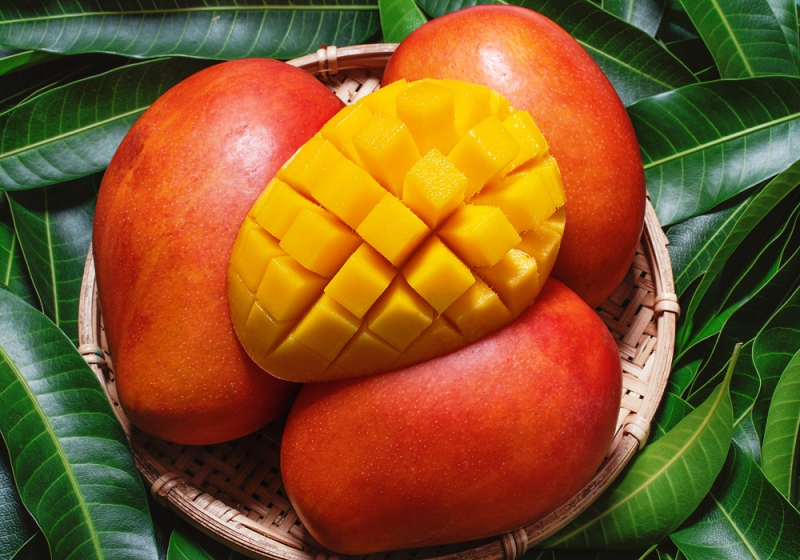
What are the nutritional values of mango ?
The mango is very rich in essential nutrients. Here are the approximate nutritional values for 100 grams of raw mango; these values may vary slightly depending on the variety of mango and its ripeness:
- Calories: approximately 60-70 kcal
- Carbohydrates: approximately 15 grams Sugars: approximately 13-14 grams
- Fibers: approximately 1.6 grams
- Proteins: approximately 0.8 gram
- Fats: approximately 0.4 gram
- Vitamin B:
- Vitamin B1 (thiamine): Approximately 0.06 mg
- Vitamin B2 (riboflavin): Approximately 0.05 mg
- Vitamin B3 (niacin): Approximately 0.6 mg
- Vitamin B6 (pyridoxine): Approximately 0.12 mg
- Vitamin B5 (pantothenic acid): Approximately 0.2 mg
- Vitamin B9 (folic acid): Approximately 29 µg
- Vitamin C: approximately 36 milligrams (approximately 60% of the recommended daily intake)
- Vitamin A: approximately 1,765 IU (approximately 35% of the recommended daily intake)
- Vitamin E: approximately 0.9 milligram
- Vitamin K: approximately4.2 micrograms
- Potassium: approximately168 milligrams
- Magnesium: approximately9 milligrams
What are the benefits and virtues of mango ?
Not only is this fruit deliciously good, but it also offers a range of health benefits and virtues thanks to its nutritional content that we discussed earlier and its bioactive compounds. Here are the most well-known and notable benefits of mango:
- Excellent source of vitamins and antioxidants: The mango can provide vitamins C and A, which act as antioxidants. These antioxidant properties help to neutralize free radicals in the body, thereby contributing to the reduction of cellular damage and simultaneously supporting the immune defenses.
- A good source of vitamin B: The mango is a good source of several B vitamins, including vitamin B1, vitamin B2, vitamin B3, vitamin B5, vitamin B6, and vitamin B9. B vitamins are essential for many bodily functions, including energy production, nervous system health, red blood cell formation, and metabolism regulation.
- Good for digestion: This tropical fruit is known for relieving constipation problems due to the presence of dietary fibers and digestive enzymes that greatly help promote regular bowel movements.
- Combating elevated blood sugar levels: The fibers and phytochemical compounds present in mangoes can stabilize blood sugar levels in healthy individuals and also reduce these levels in sick individuals, which can be beneficial for people with type 2 diabetes.
- Eye health: The mango contains vitamin A, which is essential for eye health. It also contains lutein and zeaxanthin, which are natural pigments present in the flesh of the mango. These contribute to preventing vision problems such as age-related macular degeneration (AMD), an eye disease that can lead to a loss of central vision.
- Protect your heart: Thanks to the pectin present in mango, which is classified as a soluble fiber, it is very beneficial for cardiovascular health. It helps regulate LDL cholesterol (bad cholesterol) and improves vascular function. Additionally, the potassium in this fruit helps regulate heartbeats, which promotes the control of heart rhythm and the maintenance of normal blood pressure.
- Helps maintain a healthy weight: And it works both ways, that is, for people who want to lose weight and for those who want to gain weight. Let me explain: in the first case, the fiber and water present in mango can contribute to satiety, which can help control appetite, making it easier for people who want to lose weight. On the other hand, in the second case, mango contains between 60 and 70 calories per 100 grams, which can be very beneficial for weight gain when eaten in sufficient quantities and, of course, accompanied by physical exercises such as weight training.
- Skin health: The vitamins A, C, and E present in mango are beneficial for skin health. These vitamins play roles in: maintaining skin elasticity, preventing premature aging, and promoting radiant and luminous skin.
How to consume mango? (Leaves, fruit...)
Most of the time, the mango is consumed as a fruit, but in some cultures, other parts of the plant can be used. Let's see together how you can use it:
Mango fruit: Of course, this is the simplest and easiest way to consume mango as a fruit. It can be eaten fresh as it is, simply by peeling it and cutting the flesh around the pit. The ripe fruit should be quite soft to the touch. You can use the fruit to make a mango salad or fruit salads, and you can even use it in your savory dishes.
Mango leaves: The use of mango leaves is much more common in certain Asian cuisines. These leaves can be used to wrap food as a kind of natural baking paper, or to prepare infusions or teas.
Mango peel: Mango peel is less commonly consumed compared to other forms, but in some cultures, it is dried and ground to be used as a spice in cooking.
Freeze-dried mango: The freeze-dried mangoes They allow for the preservation of the shape, color, flavor, and 90% of the nutritional value of the mango, with a very long shelf life. These mangoes are ideal for snacks or for adding a touch of sweetness to various dishes (in powder or small pieces).
Mango chutney: In some cuisines, mango is used to prepare sweet and spicy chutneys. It is a tangy sauce made with fruits like mango (or vegetables), spices, and aromatic ingredients, and it is often served as a side dish with curry to enhance the flavors.
Mango juice: If you are a fan of natural fruit juices, mango juice is very popular and very good. You just need to press fresh mangoes to extract the juice. It can be consumed on its own or used as a base for cocktails, smoothies, and refreshing drinks. (Note: mangoes cannot be used in a juicer)
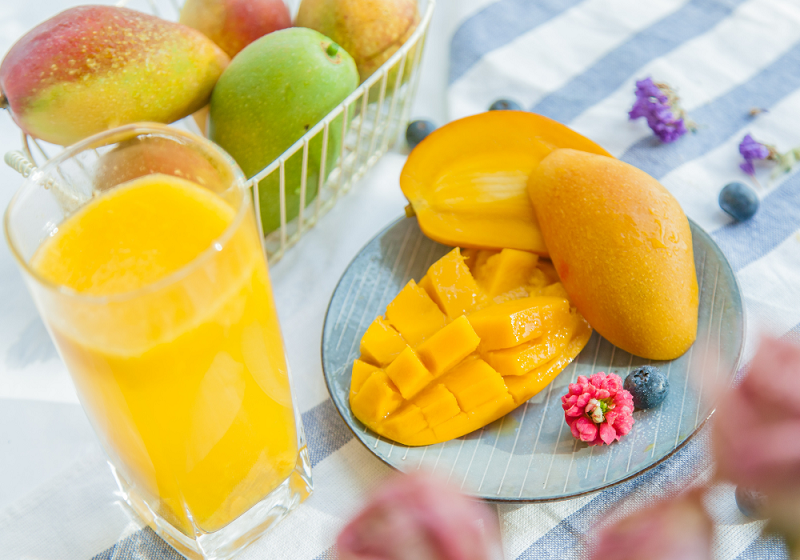
Is it better to eat mango in the evening or in the morning ?
You can eat mango at any time of the day. Since it is not forbidden to eat it in the morning or even in the evening, the decision is yours to eat it whenever you want and according to your personal preferences. However, here are a few points to consider:
- The mango is naturally sweet and rich in carbohydrates, making it an excellent source of energy and helping you feel full to tackle the various activities of the day.
- If you enjoy sweet meals in the morning, mango can be a delicious and refreshing option to add variety to your breakfast. It will help you feel energized to start your day in great shape.
- Even though mango is rich in carbohydrates, it will not disrupt the quality of your sleep if you eat it in the evening, thanks to the fibers that regulate blood sugar levels.
- Some people may be sensitive to mango as it can cause them bloating and gas, so it would be better for them to consume it a few hours earlier before sleeping.
Our recipe with mango:
We have prepared a great recipe for you with mango: a quinoa salad with mango and avocado. It's a fresh, colorful salad recipe full of exotic flavors that you can enjoy for lunch or dinner.
Ingredients:
- 1 cup of quinoa
- 2 cups of water
- A beautiful ripe mango, peeled and diced
- 1lawyer ripe, peeled, pitted, and diced
- 1/2 cucumber, diced
- 1/4 cup of red onion, finely chopped
- 1/4 cup of fresh cilantro, chopped
- Juice of 1 to 2 limes
- 2 tablespoons of olive oil
- Salt and black pepper, to taste
- Optional: sunflower seeds or roasted zucchini seeds for garnish
Instructions:
- Rinse the quinoa with cold water. Let it sprout for 24 to 48 hours using a fine strainer. If you prefer, you can also cook it. In a pot, bring the 2 cups of water to a boil. Then add the quinoa, reduce the heat to low, and cover. Let it simmer for about 12 minutes or until the quinoa is cooked and the sprouts are detached. Remove from heat and let it rest, covered, for 5 to 10 minutes. You can check out our tips for perfectly cooking quinoa in our article "How to prepare quinoa (cooking time) ?Sure, I'd be happy to help. Could you please provide the text you would like translated?
- In a large bowl, mix the cooked or sprouted quinoa, mango cubes, avocado cubes, cucumber cubes, chopped red onion, and fresh cilantro.
- In another bowl, prepare the dressing by mixing the lime juice, olive oil, salt, and black pepper.
- Pour the dressing over the salad and gently toss to coat all the ingredients well.
- Refrigerate the salad for about 30 minutes to allow the flavors to blend.
- Just before serving, garnish the salad with sunflower seeds or grilled zucchini if desired.
Enjoy your meal !



